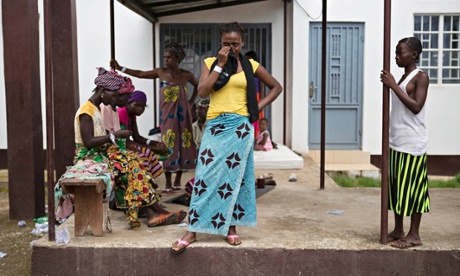Women, Peace & Security
Source: The Guardian
Women are not only more likely to be infected; their education, healthcare, food security and livelihoods are also suffering
When we consider the impact of the Ebola outbreak, our thoughts turn to the things we can quantify: the number of victims, deaths, survivors, orphans. With the death toll in west Africa at 4,033 and rising, the world has finally comprehended the sheer scale of the crisis. The figures are frightening.
However, here in Sierra Leone it is becoming increasingly clear that the impact extends far beyond anything that can be counted. In many respects, the collateral damage has been overlooked so far, but it can no longer be ignored in our humanitarian response.
Each day brings stories of the hidden harm to all facets of people's lives, including education, maternal healthcare, food security and livelihoods. From the accounts I've heard, one thing is evident: women are particularly vulnerable to the virus.
Women make up 51% of Sierra Leone's population: they are the key to the country's social and economic development. This is why gender activists and women's advocacy groups in the country have joined forces in urging leaders to address the disproportionate effect of Ebola on the female population. It is estimated that 60% of the total fatalities in west Africa have been women (pdf); in Liberia, the figure is reportedly as high as 75%.
In Sierra Leone's patriarchal society, women are the primary care-givers at home and in the community. Custom dictates that they tend to sick family members, nurse children and work as traditional healers and healthcare assistants. It is sisters, daughters, aunts, mothers and grandmothers who have selflessly cared for relatives infected with Ebola; unwittingly, they have put themselves at great risk.
When their relatives die, it is women who perform the funeral rituals, which involve touching the highly infectious corpse. In Guinea, burial practices are linked to 60% of Ebola cases. The figure is thought to be similar in Sierra Leone. I have heard alarming reports of angry groups hijacking Ebola burial teams and forcibly removing the bodies of their loved ones, in order to give them a "fitting" sendoff.
Widespread confusion and misunderstanding about the causes and consequences of Ebola has perpetuated the spread of the virus. That's why it has been so critical for Christian Aid partners to train hundreds of community health volunteers to raise awareness of the disease.
Women have also been threatened by the near collapse of the fragile health infrastructure: medical facilities are overwhelmed and under-resourced, many private hospitals are closed and public hospitals are no longer dealing with non-Ebola cases. Consequently, there is little in the way of healthcare provision for more common conditions such as malaria or typhoid.
 A woman thought to be infected with Ebola outside Port Loko District hospital, Sierra Leone.
A woman thought to be infected with Ebola outside Port Loko District hospital, Sierra Leone.
It is estimated that 60% of deaths in west Africa have been women. Photograph: Tanya Bindra/AP
Sierra Leone has one of the world's highest maternal mortality rates: 890 of every 100,000 women die from pregnancy-related causes. Thanks to the national free healthcare initiative (for pregnant women, lactating mothers and children under five), we had made some strides in getting pregnant women to move away from using traditional birth attendants.
Sadly, there is now a huge decrease in the numbers of women going to clinics for antenatal care and deliveries. Statistics are hard to come by, due to limitations on movement, but there is a real risk that women who are too afraid to seek medical care are instead dying at home from complications in childbirth. Meanwhile, access to family planning services is limited. This means that the meagre gains are being further eroded.
Education – so critical to help young women develop – is also under threat. Schools are closed indefinitely. This is no small matter in a country where 60% of people are illiterate. In households where children have been orphaned, it is likely that girls will have to drop out of school to assume the role of the care-giver.
Women dominate Sierra Leone's informal sector, which has been hard hit. The women who rely on market trade, micro-credit schemes and agricultural work are experiencing a severe loss of income. Food and cash-crop production has been interrupted: food prices are rocketing and food security is now a serious concern. At Christian Aid, we are particularly concerned about the welfare of people in quarantine, who have very little means of accessing food.
Those losing out, but for once in a welcome way, include Sierra Leone's Sowei women. These traditional leaders carry out initiation ceremonies on young girls as part of their entry into the Bondo secret societies. Female genital mutilation (FGM) is a key part of the initiation into these all-female societies: some studies suggest over 90% of girls in Sierra Leone are subject to FGM.
The initiation ceremony normally takes place during the long school holiday between June and August. However, the national Sowei Council has suspended all Bondo society initiations during the Ebola outbreak. As a Sierra Leonean woman who has long spoken out against FGM, this outcome is one silver lining to a very dark cloud.
